Robert Oppenheimer: The myth and the mystery
By Richard Rhodes | December 18, 2018
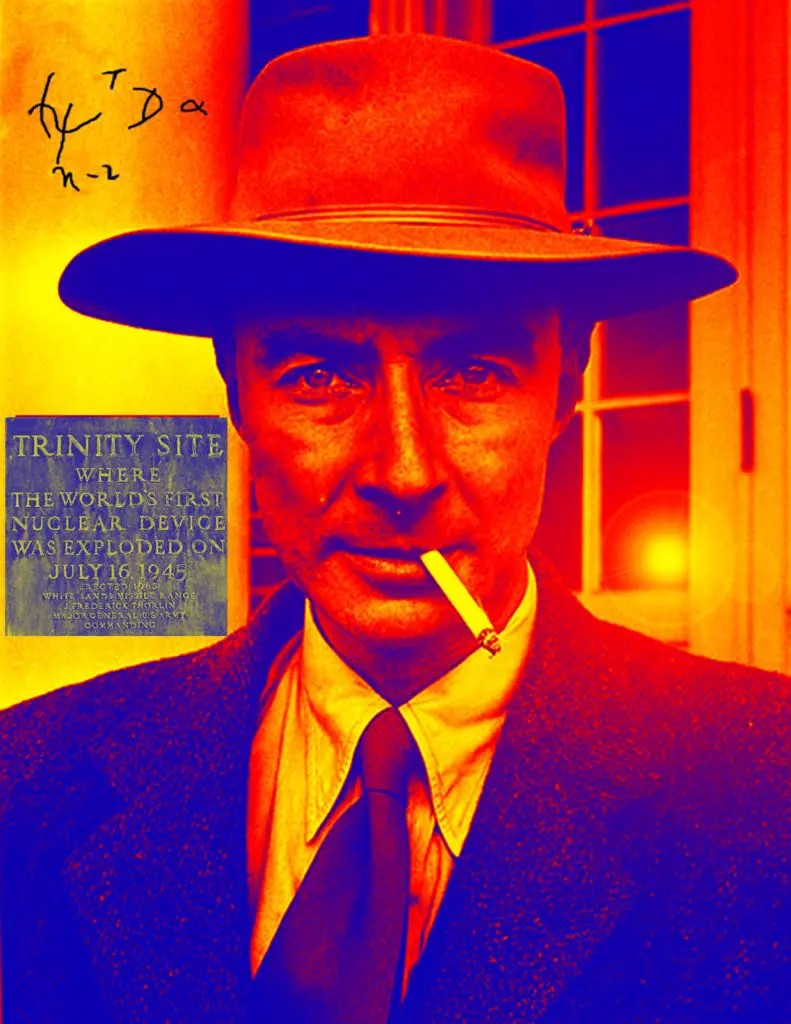 "Oppenheimer, Julius Robert," by David A. Wargowski, December 5, 2018
"Oppenheimer, Julius Robert," by David A. Wargowski, December 5, 2018
Editor’s note: What follows is the prepared text for a lecture delivered at Santa Fe, New Mexico, on July 14, 2018 and sponsored by the Santa Fe Opera during its production of Dr. Atomic, which focuses on the atomic bomb and its creators.
The Manhattan Project is fading into myth. The last of its first-rank leaders, Hans Bethe, died at Ithaca in 2005. The letter from Einstein to Roosevelt eclipses the British MAUD Report on the feasibility of making the Bomb. Los Alamos, a laboratory on a mesa surrounded by a wilderness, a small coterie of scientists witching historic transmutations, eclipses armies of workers and vast factories at Hanford and Oak Ridge. Hiroshima eclipses Nagasaki, poor Nagasaki, even as the war in Europe with its epic D-Day extravaganza eclipses the longer and crueler Pacific War. And to our point here today, Robert Oppenheimer, a century and a decade after his birth on April 22, 1904, has eclipsed General Leslie Groves and half a hundred others as the shining talent, the indispensable leader of the project, the Prospero or the Faust of the tragic epic that the story of the first atomic bombs has become.
The true history, as we all know, is far otherwise: The MAUD Report and three successive National Academy of Sciences reports won Franklin Roosevelt’s commitment; the first atomic bombs were designed and built at Los Alamos, to be sure, but the armies of workers and the vast factories produced their rare materials. Nagasaki suffered equally with Hiroshima for the Japanese leadership’s refusal to surrender. Russian sacrifice, the allied lend-lease program and invasion achieved victory in Europe, but it needed atomic bombs to end the Pacific War. And no one who was part of the Manhattan Project, even within the close, intense community here in New Mexico, doubted that General Groves was in charge. Nor did the project lack for other colorful characters, larger than life-sized: Bethe, Glenn Seaborg, Edward Teller, Ernest Lawrence, Enrico Fermi, Vannevar Bush, Arthur Compton, Leo Szilard, Harold Urey, Luis Alvarez, Emilio Segre, Eugene Wigner, Crawford Greenewalt, Paul Tibbets, Ken Bainbridge, I. I. Rabi, George Kistiakowsky, Deke Parsons, and of course Klaus Fuchs and many others—people whom I and many of you here knew in person, though I was not so fortunate as to meet Oppenheimer before his early death from throat cancer in 1967, at 63.
It’s worth asking why one man, Robert Oppenheimer, the director of the Los Alamos laboratory at the time, should emerge from such a rich and crowded field of candidates as the central figure of what is arguably the single most important historic development of the 20th century. It’s worth asking as well if his early understanding of the consequences of the explosive release of nuclear energy stands up to the years of history since his time.
That Robert Oppenheimer’s complexities should be reduced to a mythical unity is ironic. His contemporaries found him various indeed. Tall, thin, handsome, brilliant, with piercing blue eyes, chain-smoking, intense, elegant, witty, cruelly dismissive when he chose to be, generous, passionate, idealistic, but also divided within himself and by his own admission self-loathing, he seemed different men to different people. Edward Teller told me that Robert Oppenheimer was the finest lab director he had ever known, and I took that assessment seriously: praise from a man’s worst enemy is praise indeed. Hans Bethe told me Oppenheimer was able to direct the effort at Los Alamos so successfully because he was so much smarter than everyone else, and Bethe, who won the 1967 Nobel Prize in physics, included himself in that comparison. Bethe also told me—a more telling insight, I think—that Oppenheimer had been casually cruel to people who made mistakes around him, including Bethe, before the war and after the war, but that he suspended the hostilities at Los Alamos.
Chester Barnard, president of New Jersey Bell, described Oppenheimer in 1947 as “an extraordinary man who worked very hard and always seemed to be on the verge of a nervous breakdown.” His students and his friends saw him differently from his enemies, of course; to Lewis Strauss, Boris Pash and William Borden, among others, Oppenheimer was a Machiavellian schemer and a Communist spy. To Oppenheimer’s enemies, in the terrible security hearing they imposed on him that condemned him to internal exile and destroyed him, tough-minded Columbia physicist and Nobel laureate I. I. Rabi had the irrefutable rebuttal: “The suspension of the [security] clearance of Dr. Oppenheimer,” Rabi told the Gray Board, “was a very unfortunate thing and should not have been done … against a man who had accomplished what Dr. Oppenheimer has accomplished. There is a real positive record, the way I expressed it to a friend of mine. We have an A-bomb and a whole series of it and, we have a whole series of super-bombs, and what more do you want, mermaids?”
Rabi knew him well. “He was an aesthete,” Rabi described Oppenheimer to Bill Moyers. “I don’t think he was a security risk. I do think he walked along the edge of a precipice. He didn’t pay enough attention to the outward symbols. He was a very American person of a certain kind. A certain kind of intellectual, aesthetic person of the upper middle classes.” On another occasion Rabi assessed his friend’s personal conflicts and their consequences for his science. “I found him excellent,” Rabi said. “We got along very well… . I enjoyed the things about him that some people disliked. It’s true that you carried on a charade with him. He lived a charade, and you went along with it. It was fine—matching wits and so on. Oppenheimer was great fun,” Rabi goes on, “and I took him for what he was. I understood his problem….[His problem was] identity….He reminded me very much of a boyhood friend about whom someone said that he couldn’t make up his mind whether to be president of the B’nai B’rith or the Knights of Columbus. Perhaps he really wanted to be both simultaneously. Oppenheimer wanted every experience. In that sense, he never focused. My own feeling,” Rabi concludes, “is that if he had studied the Talmud and Hebrew, rather than Sanskrit, he would have been a much greater physicist. I never ran into anyone who was brighter than he was. But to be more original and profound I think you have to be more focused.”
I am certainly not competent to judge if Oppenheimer’s science was less original and profound than it might have been. Perhaps Rabi was. But I’d like to look briefly at what I believe to be Oppenheimer’s greatest achievement after the bomb itself, an original and profound achievement indeed, and neglected in something of the same way that the original discovery of the antibiotic properties of penicillin was neglected, resting in the files waiting to be pulled out and understood for what it is: the only ultimate answer to the hard, cruel fact of the bomb, to Curtis LeMay’s “the bombers always get through” and William Borden’s “there will be no time”: I mean the Acheson-Lilienthal Report that Oppenheimer in 1946 guided his four colleagues on Acheson’s panel of experts to prepare.
John Manley once commented sardonically that “quite contrary to the way I thought things were [in Washington,] you don’t do staff work and then make a decision. You make a decision and then do the staff work.” In the curious way of government reports, the Acheson-Lilienthal Report originated in the Truman Administration ‘s late-1945 Agreed Declaration with Britain and Canada “to prevent the use of atomic energy for destructive purposes” and “to promote the … utilization of atomic energy for peaceful and humanitarian ends.” Such action required a plan; Jimmy Byrnes as Secretary of State got the job of devising it. Byrnes appointed a protesting Dean Acheson to be chairman of a committee that included General Groves (who of course had headed the Manhattan Project) and three other figures who’d played roles in the effort to create the Bomb, Vannevar Bush, James Conant and John J. McCloy. Acheson in turn appointed a five-man expert panel to advise the committee. David Lilienthal, chairman of the Tennessee Valley Authority, chaired it, and besides Oppenheimer it included Monsanto chemist Charles Thomas, General Electric engineer Harry Winne, and American management theorist Chester Barnard—not exactly a bunch of wild-eyed internationalists.
Oppenheimer came prepared. He had explored the complexities of international control not only with Niels Bohr at Los Alamos and with Conant but also with Rabi. “Oppenheimer and I met frequently and discussed these questions thoroughly,” Rabi said later. “Once [Oppenheimer] got interested in something, he went right on to become the leader of it.” Gordon Arneson, the State Department’s specialist on atomic matters, says Oppenheimer became “the chief teacher for the Acheson-Lilienthal group.”
The men met first in Washington. Oppenheimer gave them a 10-day course in nuclear physics, properly taking control, as the only real expert, of defining the technical basis of the problem, but other than serving as their savant he kept his own council at first. They moved next to New York to talk to a group of scientists, including Berkeley physicist Luis Alvarez, who had explored for Groves a scheme of control by inspection alone, involving what we would now call national technical means.
Discussion intensified. Ideas came from every side—these were men of diverse background and conviction—and they debated them night and day. When patience gave way to exasperation and someone proposed simply outlawing the bomb, which happened frequently, Lilienthal always waved a newspaper clipping about the Agreed Declaration to remind them that their government had already committed itself to international control. Back to Washington to study geology. They made progress. Then they got seriously stuck. Lilienthal proposed they tour the nuclear facilities at Oak Ridge and Los Alamos. Whiskey on the train down to Knoxville, Tennessee, and a hung-over tour of the vast gaseous-diffusion plant at Oak Ridge, where supervisors prowled among the surreal piping on bicycles, warmed their friendship.
They flew to Los Alamos in Groves’ personal C-54. The President was trying to reach Lilienthal—to offer him a Cabinet post as Secretary of the Interior, the TVA chairman wrongly thought—but not even that provocation dulled him to the significance of the secret mesa, as he wrote, “with the high mountains forming a majestic backdrop” where they “went into casual little buildings, saw things only few men have seen, talked with soft-spoken, gentle, intelligent men about the things they had done…”.
“Now I have a sense,” Lilienthal concluded, “that this thing of atomic bombs is real….”
Herb Marks, Acheson’s personal representative to the panel, who accompanied the men on their travels, caught the mood and a whiff of the essence of the problem: “It wasn’t a large place,” he wrote of the building on the Hill where they examined the unassembled components of the few bombs yet in the stockpile, “…and it wasn’t a spectacular one. I looked around me and there were the same materials, colors, textures, and fabrics you might see in any warehouse. I saw the receptacles that contained the labor of God knows how many men, the cargoes of thousands of freight cars, the mental triumphs of gifted scientists born in a dozen countries. The receptacles were small, and I thought to myself, hell! I could walk out of here with one of them in my pocket. Not that I could have. Too many soldiers outside and inside the vault were watching us closely—tough troops who looked as though they kept their rifles cleaned. And supposing I had got away with one, what could I, an ordinary layman, have done with it?”
“In a way,” Marks concludes, “the same was true of so much of the whole Manhattan District. It bore no relation to the industrial or social life of the country; it was a separate state, with its own airplanes and its own factories and its thousands of secrets. It had a peculiar sovereignty, one that could bring about the end, peacefully or violently, of all other sovereignties.”
What that panel of hard-eyed, practical men came to was a radical proposal. Remarkably, it won their common agreement. When Bohr read it he wrote Oppenheimer of his “deep pleasure.” In every word of it, he said, he found “just the spirit which I think offers the best hopes for the development in which we all put our whole faith.”
Most of you know what was in that report, though I wonder every time I reread it if anyone in authority ever quite grasped the full import of its argument. It was nothing less than an argument for nuclear abolition when no more than a few bombs had yet been built, anticipating the nuclear arms race and all its near misses and understanding that the bombers (or the missiles) always get through. “Any system,” it argued, “based on outlawing the purely military development of atomic energy and relying solely on inspection for enforcement would at the outset be surrounded by conditions which would destroy the system.” To the contrary, “every stage in the activity leading from raw materials to weapons needs some sort of control.” If, for example, a putative international Atomic Development Authority were the only entity that could legally own and process uranium ore, then “not the purpose of those who mine or possess uranium ore but the mere fact of their mining or possessing it becomes illegal, and national violation is an unambiguous danger signal of warlike purposes. The very opening of a mine by anyone other than the international agency is a ‘red light’ without more; it is not necessary to wait for evidence that the product of that mine is going to be misused.” And if the Authority spread its mines and factories and laboratories and reactors around the world, so that their benefits could be shared, then “the real protection will lie in the fact that if any nation seizes the plants or the stockpiles that are situated in its territory, other nations will have similar facilities and materials situated within their own borders so that the act of seizure need not place them at a disadvantage.”
This remarkable idea—spreading the intrinsically dangerous mines and factories around—is indistinguishable from what has come to be called nuclear proliferation, except that the agent of proliferation in the Acheson-Lilienthal Report would have been an organ of the United Nations rather than individual states, and the technology that proliferated would have been infrastructure alone rather than infrastructure and stockpiled weapons.
Though the report does not belabor the point, it notes more than once that true security is incompatible with secrecy. Its proposal for a radical system of self-policing makes starkly clear what the condition that Niels Bohr had called an “open world” would be: a world where how to design atomic bombs might be public knowledge (as it has come to some extent to be); a world, as it were, where the guns had all been laid out together in the open on a table, but disassembled, and arranged so as to be within everyone’s equal reach.
Would it have worked? In a much more unstable and dangerous form, as state-sponsored nuclear proliferation, it did and does. It would work without warheads and weapons in a world with much greater transparency than presently obtains. We are moving rapidly toward that transparency anyway as new technologies penetrate privacy and sweep secrets away; it’s no great prediction to say that by 2050, the only privacy that will be left in the world will be the privacy we legislate for ourselves.
Oppenheimer and his colleagues’ farsighted proposal may have been premature. Certainly the Soviet Union had no intention of abrogating atomic arms until it knew how to build them. Bernard Baruch, who modified the Acheson-Lilienthal Report into his Baruch Plan to present to the United Nations, missed the point completely when he complained that the Report “did not deal with the problem of enforcement.” Enforcement, of course, is what the Report’s “red light” was about: a move to commandeer any part of the nuclear infrastructure would be an act of war, to which other nations might respond accordingly. Not understanding, Baruch added a clause promising “swift and sure enforcement” and demanded that the Security Council give up veto authority in atomic matters, guaranteeing the rejection of his version of the plan. Oppenheimer, observing that the United Nations was hardly the place to forge agreement on the highest matters of national security policy, judged shrewdly and probably correctly that his government was not serious in any case about international control.
Oppenheimer chaired one more panel on disarmament, for Dean Acheson, in 1952. Vannevar Bush and Allen Dulles sat among its members; McGeorge Bundy served as secretary and rapporteur—once again, experienced and sober men, for whom only a paranoid could imagine that Oppenheimer might serve as a Svengali. As had the Acheson-Lilienthal Report, Oppenheimer’s panel also came to a conclusion about the new knowledge of how to release nuclear energy that is as valid today as it was then, and as inescapably final:
Fundamentally, and in the long run [the report concluded], the problem which is posed by the release of atomic energy is a problem of the ability of the human race to govern itself without war. There is no permanent method of excising atomic energy from our affairs, now that men know how it can be released. Even if some reasonably complete international control of atomic energy should be established, knowledge would persist, and it is hard to see how there could be any major war in which one side or another would not eventually make and use atomic bombs. In this respect the problem of armaments was permanently and drastically altered in 1945.
Nuclear weapons made supposedly more useable and therefore credibly deterrent with lower yields will not solve the problem, nor will bunker busters, nor will missile defenses, nor will preemptive wars. Only the deterrence of knowledge in an open world—which means, practically speaking, nothing more utopian than delivery times from mothballed factory to target of three months rather than delivery times from silo to target of thirty minutes—only the deterrence of knowledge without stockpiles will buy the world the space it needs to come to its senses or act in concert whenever an entity bent on domination attempts to violate the ban.
Which is another way of saying that the problem will never go away. Of course it won’t: Knowledge of how to release nuclear energy is new knowledge of the natural world, to which the human world has no choice but to adapt or be destroyed, just as knowledge of global warming is new knowledge of the natural world, just as knowledge of smallpox and polio and other scourges was new knowledge of the natural world. With Bohr, Oppenheimer understood that truth, and it was a deeper understanding than theoretical physics, original and profound.
I take exception to the portrayal of Robert Oppenheimer in Doctor Atomic. His was not a Faustian bargain, a deal with the Devil, nor was the commitment of the other men and women of the Manhattan Project. The British and American race to build the first atomic bombs was predicated on the assumption that Nazi Germany was racing to the same end, had first-class physicists like Werner Heisenberg committed to the task, and had at least a year’s head start. The assumption may have been wrong, as it turned out to be—the German atomic bomb program took an early wrong turn toward building a nuclear reactor and never recovered from its mistake—but that was not a gamble we were prepared to risk.
Recall that many of the scientists urging the US government to develop the Bomb were Jewish refugees from Nazi Germany, keenly aware of the kind of genocidal state Germany had become under Adolf Hitler. The prospect of a Third Reich with atomic bombs was intolerable. Among the records of the Nazi SS I studied for my book on the SS-Einsatzgruppen, Masters of Death, were plans to continue the Holocaust into Britain, the United States and the rest of the world, to kill not six million Jews but 20 million, to the last man, woman and child. Racing for the bomb was not a Faustian bargain, nor was it a message of threat to the Russians. It was an act of desperation, accorded the highest priority of any American military project of the Second World War.
When Oppenheimer recruited the men and women he needed for his secret laboratory at Los Alamos where the actual bombs would be designed, built, and tested, he was not free to tell them what work he needed them to do. Instead, as he walked with them on university campuses all over America, he told them something he believed to be true that he hoped would be persuasive. “I can’t tell you what work we’ll be doing,” he said in so many words. “But I can tell you that it may end this war—and it may end all wars.” That was what Bohr meant when he wrote Oppenheimer his approval of the Acheson-Lilienthal Plan. “We are in an entirely new situation,” Bohr said later, “that cannot be resolved by war.”
Enjoy Doctor Atomic for the historical fiction it is, despite its libretto of actual documents and the passionate poetry of Muriel Rukeyser. Enjoy it for its soaring score. As for Robert Oppenheimer and his complexities, I prefer to remember the farsighted and deeply felt talk he gave at Los Alamos as the wartime staff was preparing to depart, to return to their civilian lives, early in November 1945, with a great storm blowing up outside to punctuate his words. I will quote at some length.
In considering what the situation of science is [Oppenheimer said that night, 73 years ago], it may be helpful to think a little of what people said and felt of their motives in coming into this job. One always has to worry that what people say of their motives is not adequate. Many people said different things, and most of them, I think, had some validity. There was in the first place the great concern that our enemy might develop these weapons before we did, and the feeling—at least in the early days, the very strong feeling—that without atomic weapons it might be very difficult, it might be impossible, it might be an incredibly long thing to win the war. These things wore off a little as it became clear that the war would be won in any case. Some people, I think, were motivated by curiosity, and rightly so; and some by a sense of adventure, and rightly so. Others had more political arguments and said, “Well, we know that atomic weapons are in principle possible, and it’s not right that the threat of their unrealized possibility should hang over the world. It’s right that the world should know what can be done in their field and deal with it.” And the people added to that, that it was a time when all over the world men would be particularly ripe and open for dealing with this problem because of the immediacy of the evils of war, because of the universal cry from everyone that one could not go through this thing again, even a war without atomic bombs. And there was finally, and I think rightly, the feeling that there was probably no place in the world where the development of atomic weapons would have a better chance of leading to a reasonable solution, and a smaller chance of leading to disaster, than within the United States. I believe all these things that people said are true, and I think I said them all myself at one time or another.
But when you come right down to it [Oppenheimer continued], the reason that we did this job is because it was an organic necessity. If you are a scientist you cannot stop such a thing. If you are a scientist you believe that it is good to find out how the world works; that it is good to find out what the realities are; that it is good to turn over to mankind at large the greatest possible power to control the world and to deal with it according to its lights and its values….
It’s not possible to be a scientist [ Oppenheimer continued a little later] unless you believe that it is good to learn. It’s not good to be a scientist, and it’s not possible, unless you think that it is of the highest value to share your knowledge, to share it with anyone who is interested. It’s not possible to be a scientist unless you believe that the knowledge of the world, and the power which this gives, is a thing which is of intrinsic value to humanity, and that you are using it to help in the spread of knowledge, and are willing to take the consequences….
There are many people who try to wiggle out of this, [Oppenheimer went on]. They say the real importance of atomic energy does not lie in the weapons that have been made; the real importance lies in all the great benefits which atomic energy … will bring to mankind. There may be some truth in this. I am sure that there is truth in it, because there has never in the past been a new field opened up where the real fruits of it have not been invisible at the beginning. I have a very high confidence that the fruits—the so-called peacetime applications—of atomic energy will have in them all that we think, and more.
There are others who try to escape the immediacy of this situation by saying that, after all, war has always been very terrible; after all, weapons have always gotten worse and worse; that this is just another weapon and it doesn’t create a great change; that they are not so bad; bombings have been bad in this war and this is not a change in that, it just adds a little to the effectiveness of bombing; that some sort of protection will be found. I think that these efforts to diffuse and weaken the nature of the crisis make it only more dangerous. I think it is for us to accept it as a very grave crisis, to realize that these atomic weapons which we have started to make are very terrible, that they involve a change, that they are not just a slight modification: to accept this, and to accept with it the necessity for those transformations in the world which will make it possible to integrate these developments into human life….
It is clear to me [Oppenheimer told his Los Alamos comrades] that wars have changed. It is clear to me that if these first bombs—the bomb that was dropped on Nagasaki—that if these can destroy 10 square miles, then that is really quite something. It is clear to me that they are going to be very cheap if anyone wants to make them; it is clear to me that this is a situation where a quantitative change, and a change in which the advantage of attack compared to defense is shifted, where this quantitative change has all the character of a change in quality, of a change in the nature of the world.
I know that wars have become intolerable, and the question would have been pursued after this war, more ardently than after the last, of whether there was not some method by which they could be averted. But I think the advent of the atomic bomb and the facts which will get around that they are not too hard to make—that they will be universal if people wish to make them universal, that they will not constitute a real drain on the economy of any strong nation, and that their power of destruction will grow and is already incomparably greater than that of any other weapon—I think these things create a new situation, so new that there is some danger in believing that what we have is a new argument for hopes that existed before this development took place. By that I mean that much as I like to hear advocates of a world federation, or advocates of a United Nations organization, say that here is a new argument, I think that they are in part missing the point, because the point is not that atomic weapons constitute a new argument. There have always been good arguments. The point is that atomic weapons constitute also a new field and a new opportunity of realizing, of beginning to realize, those changes which are needed if there is to be any peace….
Those are very far-reaching changes. They are changes in the relations between nations, not only in spirit, not only in law, but also in conception and feeling. I don’t know which of these is prior; they must all work together, and only the gradual interaction of one on the other can make a reality. I don’t agree with those who say the first step is to have a structure of international law. I don’t agree with those who say the only thing is to have friendly feelings. All of these things will be involved. I think it is true to say that atomic weapons are a peril which affects everyone in the world, and in that sense a completely common problem, as common a problem as it was for the Allies to defeat the Nazis. I think that in order to handle this common problem there must be a complete sense of community responsibility….
It is a new field, [Oppenheimer continued as the storm blew across the mesa] in which just the novelty and the special characteristics of the technical operations should enable one to establish a community of interest which might almost be regarded as a pilot plant for a new type of international collaboration. I speak of it as a pilot plant because it is quite clear that the control of atomic weapons cannot be in itself the unique end of such operation. The only unique end can be a world that is united, and a world in which war will not occur….
Now, this is not an easy thing, and the one point I want to hammer home, is what an enormous change in spirit is involved. There are things which we hold very dear, and I think rightly hold very dear; I would say that the word democracy perhaps stood for some of them as well as any other word. There are many parts of the world in which there is no democracy. There are other things which we hold dear, and which we rightly should. And when I speak of a new spirit in international affairs I mean that even to these deepest of things which we cherish, and for which Americans have been willing to die—even in these deepest things, we realize that there is something more profound than that; namely, the common bond with other men everywhere. It is only if you [cherish] that, that this makes sense; because if you approach the problem and say, “We know what is right and we would like to use the atomic bomb to persuade you to agree with us,” then you are in a very weak position and you will not succeed….You will find yourselves attempting by force of arms to prevent a disaster.
And, finally, from a commencement speech Oppenheimer delivered in 1946:
The atomic bomb was the turn of the screw. It made the prospect of future war unendurable. It has led us up those last few steps to the mountain pass; and beyond there is a different country.
Robert Oppenheimer had learned all that by 1946. I’m sorry to say that the rest of us—our politicians, our military, our leaders, the other nuclear powers—have not learned it yet, three score and 13 years later—to our continuing peril. I hope we will. I have to believe that we will.
Together, we make the world safer.
The Bulletin elevates expert voices above the noise. But as an independent nonprofit organization, our operations depend on the support of readers like you. Help us continue to deliver quality journalism that holds leaders accountable. Your support of our work at any level is important. In return, we promise our coverage will be understandable, influential, vigilant, solution-oriented, and fair-minded. Together we can make a difference.
Keywords: J. Robert Oppenheimer
Topics: Nuclear Risk, Nuclear Weapons, Presentation

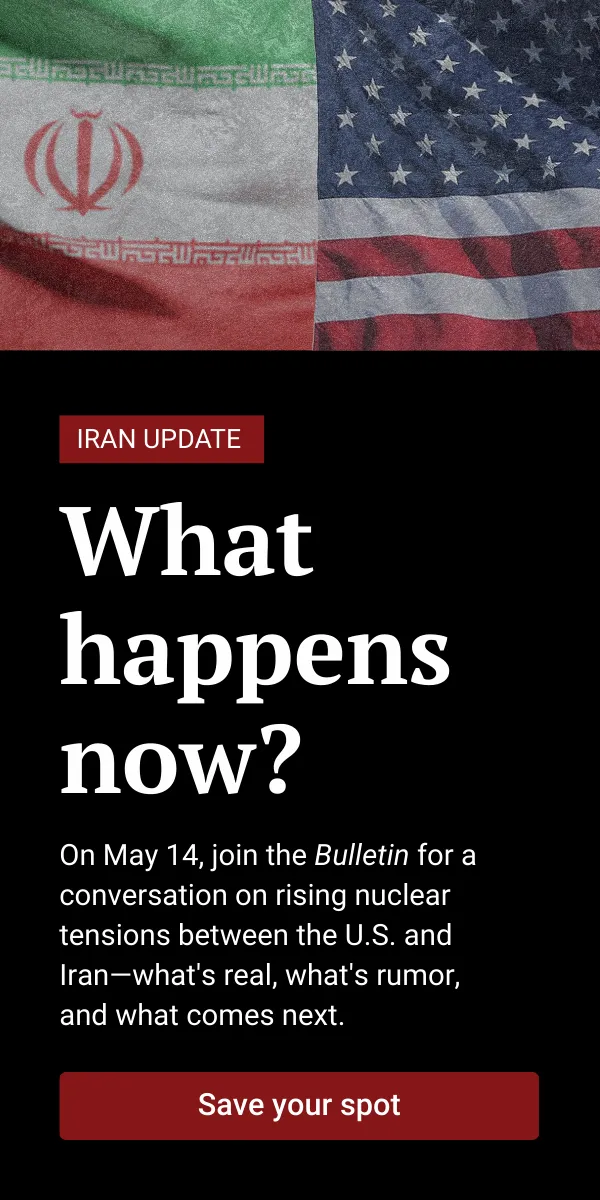

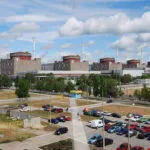

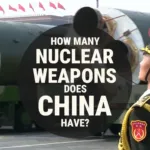
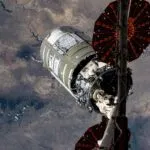
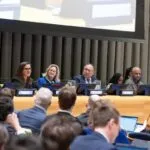

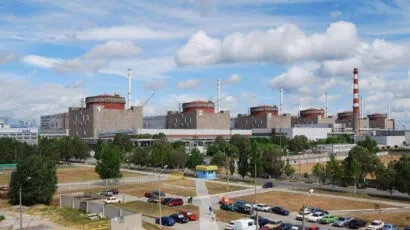
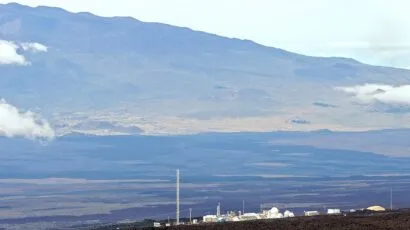
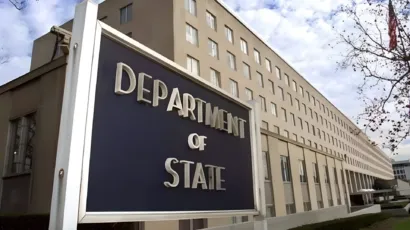
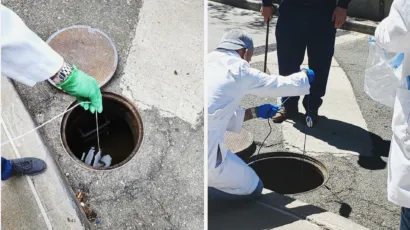
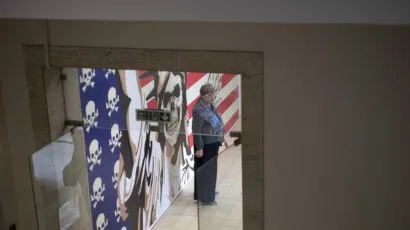
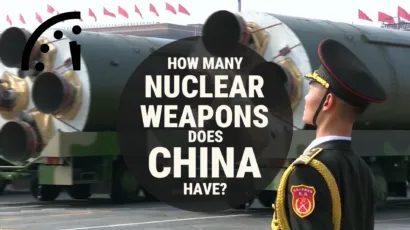

Part of the reason Oppenheimer remains a mystery was the fact that he was an intellectual poseur and a dilettante who exemplified the arrogance and self-absorption of the Los Alamos originators. While his successors did not seek the limelight or the political power available to men like Teller, Lawrence, Oppenheimer and Conant, they built up the doomsday machine that Trump continues to support. It will provide a more definitive end to humanity than even the effects of Global Warming, which it can instantly manifest in one all-out thermonuclear exchange. By putting an idiot at the head of government, the United… Read more »
“It is a new field, [Oppenheimer continued as the storm blew across the mesa] in which just the novelty and the special characteristics of the technical operations should enable one to establish a community of interest which might almost be regarded as a pilot plant for a new type of international collaboration.” International collaboration requires that humanity will recognize the existence and significance of Global Tasks. In 1989 I defined a task as global when it fulfils five necessary conditions: 1. Performing the task is necessary to confront and solve a problem, posing an existential danger, which is recognized as… Read more »
All I would add is that to deal effectively with the threat of Nuclear War, it is also essential that “all relevant actors” face that the this is existential in the ultimate sense, that we can eliminate not just humanity, but Human Civilization and all that entails, not just for those egotistical actors currently sparing for attention, but for all of our children, our grandchildren … forever. For all of them that might be born, we are making the ultimate decision, the question of life itself. I personally cannot understand how anyone who truly feels the magnitude of the Nuclear… Read more »
You are right. A German philosopher (of all people) termed the future after a nuclear war as “the death of all death” — not in the Christian sense of resurrection, but as the ultimate annihilation of the possibility of life. In this context, Kubrick’s “Dr. Strangelove” was, and still is, the epitome of an influential art work for abolition.
I doubt the film will show he tried to kill a professor (with a poison apple) or that he was identified by Russia as one of their spies. I suspect this will be yet another pro-Stalinist anti- McCarthy diatribe. That doesn’t mean it will be a bad film, I will still see it. After I see BARBIE. Which I believe, is going to be much darker than people expect.
The truth about Oppenheimer: https://open.substack.com/pub/mashupmaster/p/the-truth-about-oppenheimer-why-did?utm_campaign=post&utm_medium=email